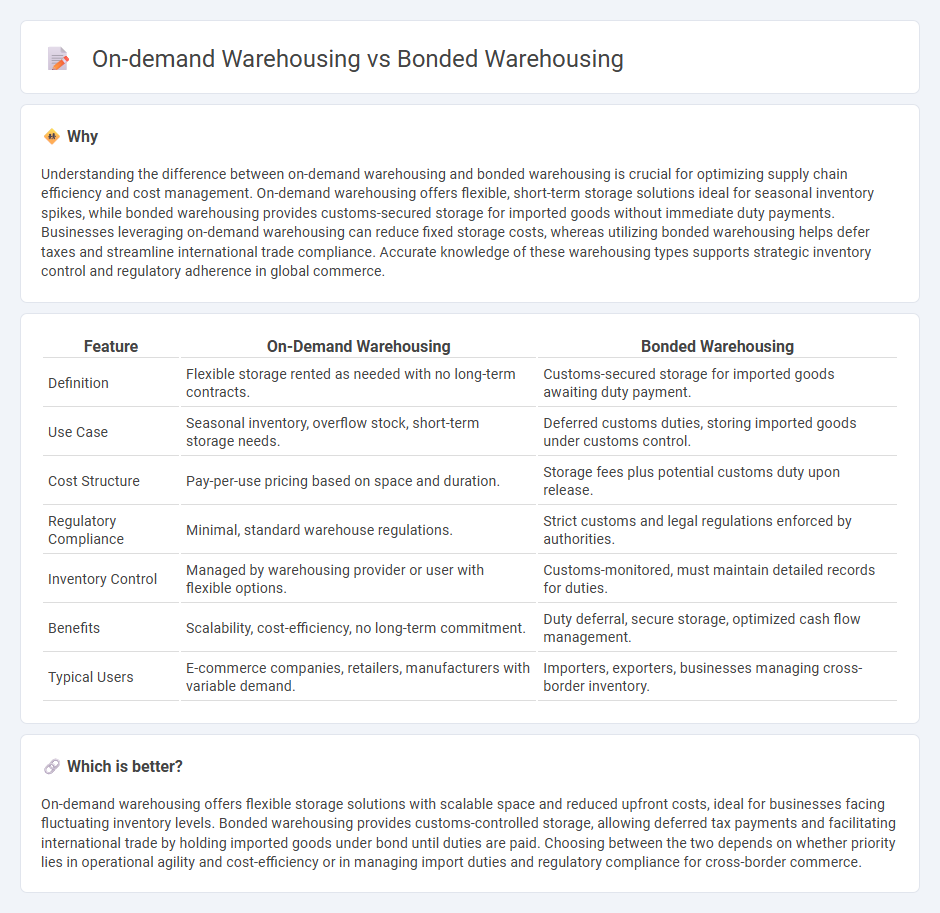
On-demand warehousing offers flexible, pay-as-you-go storage solutions tailored for fluctuating inventory needs, while bonded warehousing provides secure, customs-controlled storage for imported goods pending duty payment. Businesses leveraging on-demand warehousing gain scalability and cost efficiency, whereas bonded warehouses facilitate tax deferment and compliance with international trade regulations. Explore the benefits and use cases of each warehousing model to optimize your supply chain strategy.
Why it is important
Understanding the difference between on-demand warehousing and bonded warehousing is crucial for optimizing supply chain efficiency and cost management. On-demand warehousing offers flexible, short-term storage solutions ideal for seasonal inventory spikes, while bonded warehousing provides customs-secured storage for imported goods without immediate duty payments. Businesses leveraging on-demand warehousing can reduce fixed storage costs, whereas utilizing bonded warehousing helps defer taxes and streamline international trade compliance. Accurate knowledge of these warehousing types supports strategic inventory control and regulatory adherence in global commerce.
Comparison Table
| Feature | On-Demand Warehousing | Bonded Warehousing |
|---|---|---|
| Definition | Flexible storage rented as needed with no long-term contracts. | Customs-secured storage for imported goods awaiting duty payment. |
| Use Case | Seasonal inventory, overflow stock, short-term storage needs. | Deferred customs duties, storing imported goods under customs control. |
| Cost Structure | Pay-per-use pricing based on space and duration. | Storage fees plus potential customs duty upon release. |
| Regulatory Compliance | Minimal, standard warehouse regulations. | Strict customs and legal regulations enforced by authorities. |
| Inventory Control | Managed by warehousing provider or user with flexible options. | Customs-monitored, must maintain detailed records for duties. |
| Benefits | Scalability, cost-efficiency, no long-term commitment. | Duty deferral, secure storage, optimized cash flow management. |
| Typical Users | E-commerce companies, retailers, manufacturers with variable demand. | Importers, exporters, businesses managing cross-border inventory. |
Which is better?
On-demand warehousing offers flexible storage solutions with scalable space and reduced upfront costs, ideal for businesses facing fluctuating inventory levels. Bonded warehousing provides customs-controlled storage, allowing deferred tax payments and facilitating international trade by holding imported goods under bond until duties are paid. Choosing between the two depends on whether priority lies in operational agility and cost-efficiency or in managing import duties and regulatory compliance for cross-border commerce.
Connection
On-demand warehousing and bonded warehousing are connected through their role in optimizing supply chain logistics and inventory management. On-demand warehousing offers flexible storage solutions that can adapt to fluctuating inventory levels, while bonded warehousing provides tax-deferred storage for goods awaiting customs clearance, enhancing cash flow management. Together, these warehousing models help businesses streamline distribution, reduce storage costs, and improve compliance with international trade regulations.
Key Terms
Storage duration
Bonded warehousing offers long-term storage under customs control, allowing goods to be stored without immediate duty payment for extended periods, sometimes years, until they are ready for import or export. On-demand warehousing, however, emphasizes short-term or flexible storage solutions tailored to fluctuating inventory needs, often ranging from days to months rather than years. Explore the advantages and strategic applications of both bonded and on-demand warehousing to optimize your supply chain storage duration.
Inventory flexibility
Bonded warehousing offers businesses the advantage of deferred customs duties and taxes while storing imported goods under government supervision, providing significant inventory control during international trade. On-demand warehousing enhances inventory flexibility by allowing companies to scale storage space dynamically based on real-time demand without long-term commitments. Explore the benefits and applications of both to optimize your inventory management strategy effectively.
Customs control
Bonded warehousing involves storing imported goods under Customs control without immediate payment of duties, allowing deferred tax payments until goods leave the warehouse, which benefits cash flow management. On-demand warehousing offers flexible storage solutions without Customs supervision, suitable for domestic inventory but lacks the duty deferral advantages tied to bonded facilities. Discover the key differences and strategic benefits of each warehousing option for optimizing Customs compliance and cost efficiency.
Source and External Links
Bonded warehouse - Wikipedia - A bonded warehouse is a secured building where imported dutiable goods can be stored, manipulated, or undergo limited processing without payment of duty until exported or withdrawn for domestic consumption with duty payment.
Bonded Warehouse: Definition, Classes, and Benefits - Customs bonded warehouses store imported goods securely without immediate customs duties, allowing importers to store, manage, and ship goods under customs supervision before duties are paid upon release.
Lineage Bonded Warehouses: Navigating Trade with Ease - Lineage offers a network of strategically located bonded warehouses across the US, providing scalable, compliant storage with integrated supply chain and customs solutions to facilitate global trade.
 dowidth.com
dowidth.com